- Home
- Charlie Higson
Blood Fever Page 2
Blood Fever Read online
Page 2
‘That statuette belonged to my wife,’ Goodenough said quietly.
‘This statuette was stolen by Napoleon from the Duke of Florence,’ said Zoltan. ‘And it was stolen from Napoleon by one of your wife’s family after Waterloo. Now it is my turn to steal it.’
Goodenough made a grab for the bronze and the Magyar flicked a hand at him, as casually as if he was swatting away a fly, but it was enough to send Goodenough crashing to the deck. He lay there for a moment, stunned.
Louis cursed and ran at Zoltan but he stopped suddenly and fell back with a gasp. Tree-Trunk had hurled his harpoon into him with such force that half its length protruded from the Frenchman’s back. Louis struggled for a few moments on the deck, then lay still.
‘I did not want any bloodshed today,’ said Zoltan. ‘But you have forced my hand.’ Goodenough hauled himself groggily to his feet and glared at Zoltan. ‘You are a barbarous pig, sir. A common pirate.’
Zoltan passed the statuette to the tattooed giant and grabbed Goodenough by his shirt. ‘Do not make me angry,’ he hissed.
Goodenough looked into his eyes; the pale irises seemed to have darkened. ‘Take what you want,’ Goodenough pleaded, ‘but can you not leave the Donatello? It means a great deal to me.’
Zoltan pushed Goodenough away and took the bronze back from Tree-Trunk.
‘No,’ he said simply.
Despite himself, Goodenough grabbed him.
‘You will not take that! I don’t care what you do; you can prise it from my dead hands if you wish, but I won’t give it up without a fight.’
He took hold of the statuette and grappled with it, pressed right up against Zoltan, who was backed against a bulkhead. They struggled for half a minute before a muffled bang suddenly erupted and there was the smell of singed flesh and cloth. Goodenough staggered backwards, clutching his stomach.
‘You’ve shot me,’ he said and dropped to his knees.
‘That is very perceptive of you, Sir Goodenough. I told you not to make me angry.’
‘I’ll see you rot in hell for this.’
‘I doubt it very much. In a few minutes you will be dead. Good day to you.’
So saying, Zoltan the Magyar leapt overboard into the waiting cutter. In a moment he was joined by his oarsmen and they raced back to the steamer. Once there, he climbed over the side and stood on deck, studying the statuette and breathing heavily through his nose. Despite some minor complications it had been a good morning’s work. He ran a finger over the shapely curves of the siren’s body and smiled. In many ways it had been too easy.
As he turned to go below he suddenly felt a searing pain in his left shoulder and he dropped the bronze to the deck. He spun round and saw a short-haired girl of about fourteen wearing a bathing costume, water dripping from her thin body, a mixture of anger and fear showing on her young face.
Zoltan looked down at his tunic. It was stained dark with his own blood. He put his right hand up to where a cold, dull ache drilled into his shoulder. A knife was stuck fast there; jammed into the joint. Half of him felt like weeping and the other half felt like laughing. This girl had spirit. If he had not turned at the last moment, the knife would have stabbed him next to his spine.
His left arm hung uselessly at his side; the pain and loss of blood were making him weak.
‘You’re going to regret that you didn’t kill me,’ he said quietly.
‘One day I’ll finish the job,’ the girl said bitterly.
Zoltan was now swamped by his crew, all yelling and shouting in panic. Three of them took hold of the girl.
‘Give me air, and bring me wine,’ Zoltan snarled. ‘Bull’s Blood!’
Someone handed him a bottle and he took a long gulp, dribbling the dark red wine down his chin. Then he steeled himself and, with a furious cry, wrenched the knife out of his shoulder.
‘Sink the boat,’ he said, flinging the knife into the sea. ‘Take the women… and kill all the men.’
The knife sank through the silent water, turning and twisting, the blood washing away. It landed in the sand at the bottom and stood there like a cross on an underwater grave.
1
The Danger Society
James Bond hated feeling trapped. Wherever he was, he always wanted to know that there was a way out. And preferably more than one way out. Lying here in his tiny room at Eton, packed away under the rafters, he pictured the whole building as it slept beneath him. In his mind he wandered the dark maze of corridors and stairways that made up Codrose’s house. There were several doors downstairs, but only one that the boys had access to and that would now be locked for the night. It was no concern of his. He had his own way in and out of the building, his own secret route that nobody else knew about.
For James the most important thing was to be free, to be in charge of his own life. He didn’t really fit in at Eton, with its endless rules and age-old traditions, but Eton couldn’t hold him.
He lay perfectly still in his narrow, uncomfortable bed and listened for any sounds. Nothing. It was all quiet. He slipped out from under his sheets and went over to his ottoman. From the untidy mess within, he took out a pair of black trousers, a dark-blue rugby shirt and a pair of plimsolls, listening the whole time. He pulled the clothes on over his hated pyjamas. How he wished he didn’t have to wear them. Especially on a hot, stuffy night like this, when the air hung heavy and no breeze came in through the open window. But his housemaster, Cecil Codrose, had introduced a rule that all boys in his care should sleep in pyjamas and keep them buttoned up to their necks.
Ever since a fire had gutted one of the houses in 1903, killing two boys, the school had employed ‘night watches’, elderly ladies and gentlemen from Windsor who shuffled along the corridors at night sniffing for smoke. James wasn’t bothered about his night watch, a little old lady called Florence. She was easily evaded. But he did worry about Codrose. He was fond of creeping around the house at all times of day and night, trying to catch the boys misbehaving, and James had hit on the plan of sprinkling sugar on the bare wooden floorboards so that it crunched underfoot and gave away anyone trying to sneak up on him.
There was no crunch now. No rustle of movement anywhere in the building. For the time being he was safe.
Once dressed, he removed a short section of skirting board and slid out a loose brick from the wall. Behind it was the hiding place where he kept his valuables. He took out his penknife and torch and dropped them into his trouser pocket. Then he put everything back as it was and carefully opened his bedroom door. He kept the hinges and the handle well greased with bacon fat so that it opened without a sound. There was a creak and James paused. But it was only the 200-year-old building settling. He looked left and right down the corridor, which was lit by a dim electric light at either end. Another of Codrose’s ideas. The corridor was empty, apart from a big brown moth that sent huge shadows flapping across the dull green walls.
James’s room was on the top floor. To the right was a flight of narrow stairs and a wall separating the boys from Codrose’s part of the building. At the other end of the corridor was a storage room whose door was secured shut with a massive, rusty padlock. Halfway down was a washroom and on either side of it was a row of identical doors. Behind each door was a sleeping boy. But while they only dreamt of escape, for James it was a reality.
He always left a clear path through the sugar and soundlessly made his way along the corridor to the washroom. The hinges on this door were also well greased.
He slipped inside and closed the door behind him.
He didn’t risk turning on the light. He could make his way through here with his eyes closed, but there was enough of a glow from the moon through the windows to show him a row of tin basins, four big baths and, at the far end, the lavatory stalls. He tiptoed over the tiled floor towards the end stall and went in.
He fished his penknife out of his pocket, opened the blade and, crouching down, levered up a floor tile, exposing the floorboards beneath. Soon he
had three more tiles up and he was able to remove a neatly cut square of boards.
It had taken him two sessions to work the tiles loose, slaving away in the dead of night, using tools filched from the School of Mechanics. And it had taken him a further week to cut through the boards underneath with his penknife, as a saw would have made too much noise. Twice he had nearly been found out. On the first occasion he had heard footsteps outside, but nobody had come in. On the second occasion, though, the door had opened. James just had time to replace the tiles, scoot up the walls of the stall like a monkey and wedge himself on top of the cistern before the lights were turned on and the familiar sound of Codrose’s dry cough had filled the night.
James had heard him walking around and then he had glanced into the stall. James caught a brief glimpse of his wiry, grey hair and pale skin before he coughed once more and went on his way.
Since then James hadn’t been disturbed and now he was able to use this secret route out of the building whenever he needed to.
Under the floor was a crawl space just large enough to fit his slim body into. He passed the boards down, lowered himself in after them and replaced the tiles above his head.
He could now risk using the torch. He switched it on, illuminating a tiny passage that ran along the entire length of the building between the joists. It was filthy and dusty and laced with blackened cobwebs. He shuffled awkwardly forward on his belly, trying not to make too much noise. Above and below him were sleeping boys, but if they’d ever heard anything they’d kept quiet about it.
James crawled along until he was directly beneath the locked storage room at the end of the corridor. He remembered the night he had first got this far, and how relieved he had been to discover that several of the floorboards were loose and rotten. It had only taken him a few minutes to prise two of them free. Now he simply pushed them out of his way and wriggled up into the room.
He replaced the boards, stood up, knocking the dust off his dark clothes, and sneezed. Nothing had changed in here since his last visit. The room was piled high with forgotten school junk: broken tables and chairs, rotting camp beds, prehistoric sports equipment and boxes of yellowing books and papers. There was a tiny window in the roof, so encrusted with dirt and dust and birdlime that it barely let in any light at all. James climbed on to a pile of boxes and forced the rusted latch open. Then he folded the window back, grabbed hold of the edge of the frame and hauled himself up. In a moment he was out on the roof, in the fresh air, with the whole of Eton spread out beneath him.
It was a beautiful clear summer’s night and the moon was nearly full. James could see over the rooftops down to the river Thames and across to Windsor Castle on the other side. It was close to midnight, but there was still some activity on the streets, the odd car moving about, lights in windows, a barge going upriver towards Maidenhead.
James had planned carefully for this. He had noticed that the storage-room door never seemed to be opened, and, just to make sure, he had fixed a hair across the keyhole in the padlock, sticking it in place with two tiny dabs of grease. A week, two weeks went by and the hair was undisturbed. A quick check outside had shown him the window and a possible way on to the roof, so then he only needed to work out how to get into the room. Spotting the space beneath the floorboards when a leaking pipe was being repaired in the washroom had solved that problem.
He took a last look around to make sure that the coast was clear, then gingerly crawled up the tiles towards the top of the roof. He used the chimneys to support himself as he went over the crest and slid down the other side on to a flat section of roof, which was set into the top of the building. There was a long, oval glass dome sticking up here and, crouching low so as to avoid making a silhouette against the night sky, James sneaked along until he was looking down into Codrose’s study. As often as not the housemaster would be sitting up here at night, writing in his journals with tiny, spidery lettering and drinking from a secret bottle of gin.
James pressed himself against the roof and sidled along, peering down through the murky glass. Sure enough Codrose was there. He was a thin man with a short beard that covered half his face and the cold, dead eyes of a fish. Many of the housemasters at Eton were well loved by the boys, but not Codrose. He was mean and joyless and served the worst food in the school.
James watched him for a while, scratching away with his pen, and wondered what he found to write about. It gave James a feeling of power to be up here, seeing but not being seen. He soon moved on, however. There were things to do.
When he reached the other end of the roof he climbed over the ridge and carefully slid down to a wide stone gutter. He walked along the gutter like a tightrope walker, holding his arms out for balance, until he reached the corner. This was the most dangerous part of the route: jumping across a narrow cobbled alleyway to the building on the other side. He looked down to make sure that there was nobody below, before shuffling back along the gutter to give himself a run-up. He took a deep breath, then raced to the end and hurled himself into the air at the last moment. He landed comfortably, kept up his momentum and continued running across a short flat roof, then leapt across another, smaller gap on the other side. This was James’s favourite part of the route, over several easy rooftops, running, jumping, climbing, until he finally arrived at a long, lead-lined gulley which led to the top of the final roof. He darted up it and squeezed between the chimneys, where he was stopped by a boy’s voice, hissing in the darkness.
‘Who is it?’
‘James Bond.’
‘Enter.’
The roof of this building was similar to the one at Codrose’s, with a flat section set into the top between the chimneys, but this was smaller and had nothing as grand as Codrose’s dome. Apart from a small inspection hatch in the middle, it was featureless. But it made a perfect hideout for a group of adventurous boys who called themselves the Danger Society.
There were many clubs at Eton – the Musical Society, the Film Society, the Natural History Society and the Archaeological Society, for instance. But the Danger Society was different. It was a secret society of boys who liked to take risks. If the Danger Society was ever discovered, its members would be in deep trouble.
James, who was still only in his first year at Eton, was the youngest member; he had been approached by a friend called Andrew Carlton, who was two years older than him. They had got to know each other in the previous half, as terms were called at Eton. Andrew had realised that James was a boy like himself, easily bored by the routine of school, who might like a little spice in his life.
It was easy to join the club. You simply had to make your way to this rooftop den at night without being seen. It had taken James a while to work out how to do it, but he had persevered, and this was the fifth meeting he had attended.
He soon spotted Andrew and he did a quick headcount of the others.
‘Five,’ he said. ‘Who’s missing?’
‘Gordon Latimer,’ said Andrew. ‘He’s always late. Probably fast asleep, knowing him.’
‘And what about Mark Goodenough?’ said James. ‘Isn’t he usually the first here?’
‘M-Mark’s not going to m-make it tonight,’ said Perry Mandeville, the founder and captain of the club. ‘He’s had some bad news, not bad news like so-and-so’s caught a cold or something, proper bad news, he’s cut up something rotten, m-most likely won’t m-make it again this half.’
Perry was a restless, reckless boy who was always urging the others to try ever more dangerous escapades. He could never sit still and his words tumbled out in such a mad rush that, as his brain fought to catch up with his mouth, it caused him to stammer.
‘What’s happened?’ said James, sitting down with his back against the wall.
‘His family has been lost at sea,’ said Perry, dramatically. ‘In the M-Mediterranean…’
‘Don’t be so sensational,’ said Andrew. ‘Nobody knows exactly what’s happened.’ He sat down next to James and handed him some choc
olate. ‘They were sailing,’ he went on, ‘and their boat’s gone missing.’
‘Sounds m-much m-more exciting to say “Lost at sea”,’ said Perry, fidgeting. ‘Sounds like an adventure book, m-maybe they’re shipwrecked on a desert island, or something, or they’ve been eaten by sharks, they do have sharks in the M-Mediterranean, though not very big ones.’
‘Yes,’ said Andrew. ‘And it sounds rather like you hope they have been eaten by sharks.’
‘That’s not fair,’ said Perry. ‘M-Mark’s my friend.’
‘Precisely,’ said Andrew. ‘And this is real life, not a story. We were all kind to you when you had your break-in.’
‘What break-in?’ said James.
‘Happened last half,’ said Perry, ‘before you joined the society. Burglars broke into our house in London and stole a load of paintings, luckily m-my folks were away at the time, but one of the servants was pretty badly beaten and m-my m-mother and father are still fairly fragile about the whole thing.’
‘Exactly,’ said Andrew. ‘Well, imagine if they had been there at the time, and had got hurt. You wouldn’t think that was something to make fun of, would you?’
‘Sorry,’ said Perry. ‘But you m-must ad-m-mit, it does all sound rather exciting.’
Andrew sighed and looked heavenward, but, after all, excitement was what the Danger Society was all about. They met here every week, on a different night, chosen at random out of a hat so that they would have no noticeable routine. They didn’t really do very much on these nights; it was the getting there that was the important part. Once they were all assembled they’d just sit and chat and smoke cigarettes and plan other activities. But although the Danger Society members may have looked relaxed, they all knew that if they were caught it would be very serious. That was what made these meetings so thrilling. Despite the fact that it was late and James was tired, he felt alive and buzzing with the excitement of being out here at night.

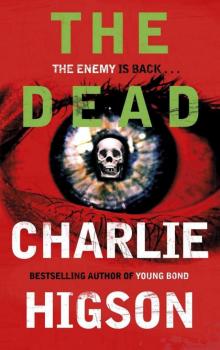 The Dead
The Dead The Sacrifice
The Sacrifice The Fallen
The Fallen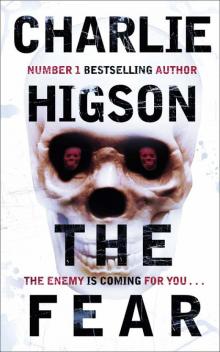 The Fear
The Fear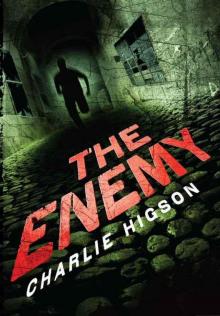 The Enemy
The Enemy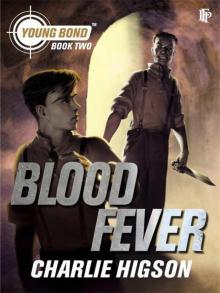 Blood Fever
Blood Fever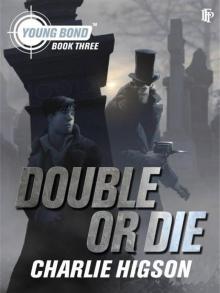 Double or Die
Double or Die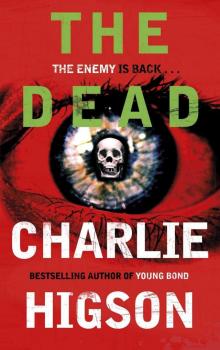 Young Bond, The Dead
Young Bond, The Dead The Hunted
The Hunted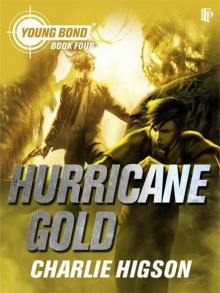 Hurricane Gold
Hurricane Gold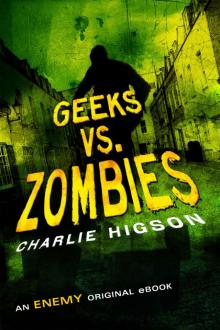 Geeks vs. Zombies
Geeks vs. Zombies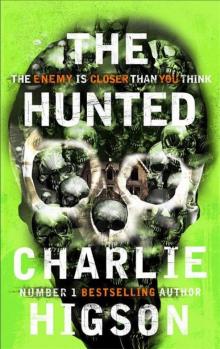 The Hunted (The Enemy Book 6) (Enemy 6)
The Hunted (The Enemy Book 6) (Enemy 6)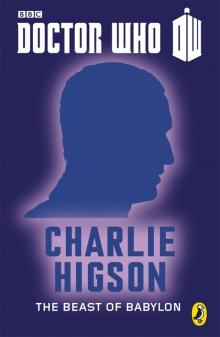 The Beast of Babylon
The Beast of Babylon